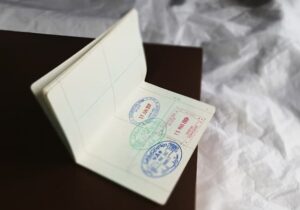Citizenship by descent is the process of gaining citizenship through ancestry where at least one parent, grandparent, or even great-grandparent was a citizen of a country. Each country has its own eligibility criteria. Some require a direct parental connection, while others accept more distant ancestors.
Depending on the country’s laws, applicants may need to renounce their foreign nationality in some cases. The process includes submitting proof of ancestry, such as birth certificates and family records, to the immigration authorities for approval.
This guide will explain how to get citizenship through ancestry, the different types of citizenship by descent, the application process, the advantages, and the countries that offer second passports through descent.
This is more of what to expect:
- What is citizenship by descent?
- Types of Citizenship by Descent
- Eligibility Criteria for Ancestral Citizenship
- Benefits of Acquiring Citizenship by Descent and Second Passport
- Eligibility Criteria for Ancestral Citizenship
- Limitations of Citizenship by Descent
- How to get Citizenship Through Ancestry
- Countries that Grant Citizenship by Descent
- Alternatives to Citizenship by Descent
What is citizenship by descent?
Citizenship by descent (also known as ancestral citizenship) is a legal process that allows a person to acquire citizenship through the nationality of their parents, grandparents or great-grandparents instead of through where they’re born.
The family lineage path is becoming more popular as a way to obtain second citizenship in a foreign country.
There are three types of citizenship by descent.
- Citizenship by descent at birth: Some countries grant citizenship by descent if a child’s parents are citizens, as shown on the birth certificate.
- Citizenship by descent after birth: It allows a child with foreign citizenship to claim dual citizenship by proving a family link, often through parents or grandparents
- Citizenship by ethnicity: This is based on a person’s cultural or ethnic background. People with Sephardic ancestry, for instance, may claim Spanish citizenship, while Indigenous peoples in countries like Canada and Australia have protected cultural and land rights under international law.
Benefits of Acquiring Citizenship by Descent and Second Passport
Getting dual citizenship through a second passport by descent offers valuable benefits, including visa-free travel, social advantages, and the right to participate in the country’s economy and politics.
Here is a breakdown of some of the benefits of claiming citizenship by descent:
 Enhanced mobility
Enhanced mobility
 Expanded educational opportunities
Expanded educational opportunities
Having additional citizenship citizenship allows access to a wider range of educational opportunities, including prestigious universities and schools. It can also eliminate or lower international student fees, making education more affordable. Dual citizens can choose from diverse educational systems, programs, and cultural experiences.
 Cultural heritage
Cultural heritage
Restoring citizenship through ancestral ties helps individuals reconnect with their heritage, customs, and language, strengthening their cultural identity. Future generations can also benefit by preserving their family’s heritage and enjoying citizenship rights.
 Expanded investment opportunities
Expanded investment opportunities
Getting dual citizenship and a second passport provides economic opportunities, such as access to more investment markets, tax benefits, and business options. It also helps avoid foreign ownership restrictions in countries like the UAE, Montenegro, Thailand, and Singapore.
 Political empowerment
Political empowerment
Individuals with dual citizenship can vote in elections, run for public office, and have a voice in shaping policies and decisions that affect their lives and the communities they belong to. An additional passport comes with the right to participate in the political affairs of two countries actively.
 Extended civil liberties
Extended civil liberties
Second citizenship obtained through citizenship by descent offers a wider range of legal protections, including the right to live, work, and own property in multiple jurisdictions. Also, dual citizenship can provide individuals with increased social and economic rights, such as access to healthcare, social programs, and education.
Eligibility Criteria for Citizenship by Descent
Parentage requirements
Requirements | Purpose |
Birth Certificate | Confirms your birth details and your parents’ identities. |
Parents’ Marriage Certificate | Establishes the marital relationship between your parents (if applicable). |
Parents’ Citizenship Evidence | Proves your parent's citizenship status at the time of your birth. |
Age considerations
Scenario | Details | Required Documents |
At the Time of Birth | If born to a citizen parent, you are typically eligible regardless of your birthplace. | Birth Certificate, Parents’ Citizenship Evidence. |
After Birth | Citizenship may be claimed after birth but before a set age (usually under 18). | Registration Form, Legal Guardian Documents (if needed) |
How to Get Citizenship Through Ancestry
Step one: Determine eligibility
You must first ask:
- How many generations back can I go? Do I need to apply through my grandparents, or can it be more distant ancestors in the direct line?
- Are there any limitations concerning the paternal or maternal side?
- Does it matter if my ancestors were not citizens by birthright?
- Which specific documents will I need to submit?
It is not possible to prove your eligibility for citizenship based on a DNA test and presenting the results to immigration officials. The entire process will require a much deeper dive into your family’s history by searching through genealogical archives and identifying the location of official documents suitable for citizenship purposes.
Step two: Prepare your application
You will need to prepare the documents to accompany your application form. This information can be obtained from the embassy or the official government website. Typical documents for an ancestral passport include:
- Your birth certificate
- Your passport
- Official records of your ancestors (birth certificates, marriage/divorce certificates, death certificates)
- Legal name change documents (if applicable)
All documents in a foreign language must be translated into the country’s official language and carry an apostille seal.
Step three: Attend interviews or examinations
Depending on the country’s specific requirements or the condition of your documentary evidence, you might be asked to participate in interviews or examinations to further evaluate your eligibility for citizenship through descent. In preparation, ensure you study the country’s relevant historical, linguistic, or civic references.
Step four: Await the decision
Once you have submitted your application and fulfilled any required interviews or examinations, you will need to wait for the final decision on your citizenship request. The timeline for acquiring citizenship by descent varies widely as it is contingent on each country’s processing procedures and bureaucratic systems.
Step Five: Apply for the passport
After receiving approval, obtain the required documentation, including a citizenship certificate.
Special Limitations of Citizenship by Descent
- Generational limits: Some countries limit how many generations can pass down citizenship.
- Residency requirements: Ancestors may need to have lived in the country for a set time before the
descendant’s birth.
- Type of citizenship: Citizenship passed down depends on whether the ancestor was a citizen by birth or naturalization.
- Maternal/paternal lineage: Some countries only allow citizenship through the father, not the mother.
- Renounced citizenship: Ancestors must not have given up their citizenship or taken another citizenship.
- Legal changes: Historical events and law updates can affect eligibility, and getting professional and legal advice can speed up the process.
- Birth abroad: Birth abroad complicates citizenship claims due to varying laws. For example, U.S. children born overseas must prove their parents lived in the U.S. before their birth. It’s more complex for those born on military bases or U.S. vessels.
Countries that Grant Citizenship by Descent
Europe
Country | Eligibility criteria | CBD generational limit | Dual citizenship allowed |
Austria | -An Austrian mother at the time of birth -An Austrian father who was married to the mother | Second | No (except for individuals who acquire Austrian citizenship by descent) |
Belgium | -At least one parent who was a Belgian citizen at the time of birth and the individual is under 18 -At least one parent who was a Belgian citizen at the time of birth (there are several residency requirements for those over 18 depending on the age of residency) | Second | Yes |
Bulgaria | -At least one parent was a Bulgarian citizen -At least one paternal ancestor was a Bulgarian citizen | Unlimited | Yes (except for naturalized Bulgarian citizens) |
Croatia | -Both parents had Croatian citizenship at the time of birth -At least one parent was a Croatian citizen and the child was born in Croatia -At least one parent was a Croatian citizen and the other parent was unknown or stateless | Second | Yes |
Cyprus | Born after 16 August 1960 and at least one parent was a Cypriot citizen or was entitled to obtain Cypriot citizenship by descent at the time of birth | Second | Yes |
Czech Republic | -At least one parent or grandparent was a Czechoslovak citizen at the time of birth -At least one parent was a legal resident and the child was born in the Czech Republic | Third | Yes |
Denmark | At least one parent was a Danish citizen at the time of birth (Denmark has had several changes in legislation for citizenship by descent, affecting those born before 1 February 1999, after 1 February 1999, and after 30 June 2014) | Second | Yes |
Estonia | At least one parent was an Estonian citizen at the time of birth | Second | No |
Finland | At least one parent or grandparent is or was a Finnish citizen by birthright | Third | Yes |
France | -At least one parent born in France and the child was born in France -At least one parent was born in France and the child requests citizenship at 18 | Second | Yes |
Germany | At least one parent was a German citizen at the time of birth | Second | No (except for a citizen of another EU country or German citizens with a German citizen parent) |
Greece | At least one parent was a Greek citizen at the time of birth | Second | Yes |
Hungary | At least one parent was a Hungarian citizen at the time of birth | Second | Yes |
Ireland | At least one parent or grandparent was an Irish citizen at the time of birth | Third | Yes |
Italy | At least one ancestor was an Italian citizen (ancestors who acquired Italian citizenship by naturalization before 14 June 1912 cannot transfer citizenship) | Unlimited | Yes |
Latvia | At least one parent or grandparent who was a Latvian citizen and was born in Latvia | Third | No (except for citizens of other EU countries, NATO member states, Australia, New Zealand, and Brazil) |
Lithuania | At least one parent, grandparent, or great-grandparent was a Lithuanian citizen | Fourth | No (except for Lithuanian citizens who gain second citizenship by marriage) |
Luxembourg | At least one parent was a Luxembourgish citizen at the time of birth | Second | Yes |
Malta | -At least one parent was a Maltese citizen at the time of birth -At least one ancestor born in Malta of a parent also born in Malta | Unlimited | Yes |
Netherlands | -A Dutch citizen mother at the time of birth (mother or father if born before 1 January 1985) -A Dutch citizen father who was married to or in a civil partnership with the mother, or acknowledged the child before birth | Second | No (except for some instances of citizenship by birthright) |
Norway | -At least one parent was a Norwegian citizen at the time of birth (if born after 1 September 2006) -A Norwegian mother (if born after 1 September 2006) -A Norwegian father who was married to the mother (if born after 1 September 2006) | Second | Yes |
Poland | At least one parent, grandparent, or great-grandparent born in Poland and who resided there after January 1920 | Fourth | Yes |
Portugal | At least one parent or grandparent was a Portuguese citizen at the time of birth | Third | Yes |
Romania | At least one parent was a Romanian citizen at the time of birth | Second | Yes |
Slovenia | At least one parent is or was a Slovenian citizen | Second | Yes (except for naturalized Slovenian citizens) |
Spain | -At least one parent was a Spanish citizen at the time of birth -Both parents were born in Spain -Both grandparents were born in Spain -A citizen of a Latin American country who has at least one grandparent born in Spain | Third | No (except for citizens of former Spanish colonies, Equatorial Guinea, France, the Philippines, and Portugal) |
Sweden | -Born after 1 April 2015 and at least one parent is or was a Swedish citizen -Born before 1 April 2015 to a Swedish citizen mother -Born before 1 April 2015 to a Swedish citizen father who was married to or in a civil partnership with the mother | Second | Yes |
Americas
Country | Eligibility criteria | CBD generational limit | Dual citizenship allowed |
Argentina | Ancestry from Argentine parent(s); proof of birth or naturalization of the ancestor | Second | Yes |
Brazil | Child born abroad to Brazilian parent(s) (parent must be Brazilian at the time of birth). | Second | Yes |
Chile | Child born abroad to Chilean parent(s). | One | Yes |
Mexico | Child born abroad to Mexican parent(s). | None | Yes |
Colombia | Child born abroad to Colombian parent(s). | None | Yes |
Peru | Child born abroad to Peruvian parent(s). | None | Yes |
Ecuador | Child born abroad to Ecuadorian parent(s). | None | Yes |
Asia
Country | Eligibility criteria | CBD generational limit | Dual citizenship allowed |
India | Child born abroad to Indian national parent(s) | One | Yes with restrictions (depends on other nationality) |
Japan | Child born abroad to Japanese parent(s). | None | No |
South Korea | Child born abroad to South Korean parent(s). | None | No |
China | Child born abroad to Chinese parent(s) (citizenship may be restricted based on the parent's residency).. | None | No |
Philippines | Child born abroad to Filipino parent(s). | None | Yes |
Africa
Country | Eligibility criteria | CBD generational limit | Dual citizenship allowed |
Senegal | -Child born abroad to Senegalese parent(s) | None | Yes |
Nigeria | Child born abroad to Nigerian parent(s). | None | Yes |
Ghana | -Child born abroad to Ghanaian parent(s). | None | Yes |
Ethiopia | Child born abroad to Ethiopian parent(s). | None | Yes |
South Africa | Child born abroad to South African parent(s). | None | Yes |
Alternatives to Citizenship by Descent
Citizenship by investment
Citizenship by investment allows individuals to get a second passport by making significant financial contributions to a country’s economy. These investments can include real estate, businesses, or government bonds.
Citizenship by investment programs are ideal for those without ancestral ties. They often have no residency or language requirements and provide benefits like faster processing, global mobility, and potential tax advantages.
Citizenship by naturalization
Citizenship by naturalization refers to acquiring citizenship of a country by meeting requirements, the most common of which being residency duration.
For instance, one could become an Italian citizen by naturalization after legally residing in Italy for 10 years. Each country has its own rules, including language proficiency, understanding of the country’s laws, an oath of allegiance, and passing a citizenship test.
Key Takeaways Citizenship by Descent
- Citizenship by descent allows individuals to claim citizenship through their ancestral lineage rather than their place of birth.
- Eligibility often depends on proving a link to a citizen ancestor (e.g., parent, grandparent).
- Some countries have generational limits, only allowing claims up to a certain number of generations.
- Applicants usually need original or certified documents, such as birth, marriage, or citizenship certificates, to verify their claim.
- Many countries allow dual citizenship for those obtaining citizenship by descent, though some require renunciation of the original nationality.
- Ancestral citizenship provides access to opportunities like living, working, and traveling visa-free in regions like the EU. It also connects people to ancestral culture and heritage and offers legal protections.
How Can Global Citizen Solutions Help You?
Global Citizen Solutions is a boutique migration consultancy firm with years of experience delivering bespoke residence and citizenship by investment solutions for international families. With offices worldwide and an experienced, hands-on team, we have helped hundreds of clients worldwide acquire citizenship, residence visas, or homes while diversifying their portfolios with robust investments.
We guide you from start to finish, taking you beyond your citizenship or residency by investment application.

Frequently Asked Questions about Citizenship by Descent
What is citizenship by descent?
Citizenship by descent, also called citizenship by ancestry, is a process that allows individuals to get citizenship in a country based on their family ties. It’s different from birthright citizenship, which is when someone is granted citizenship in the country in which they were born.
Can I claim citizenship through ancestry?
Yes, you can claim citizenship through ancestry if you have a parent, grandparent, or sometimes even a great-grandparent from a country that offers citizenship by descent. Each country has different rules, so you’ll need to provide proof of your ancestral connection through official documents.
Can you get citizenship by DNA test?
How do I prove my ancestry for citizenship?
To prove your ancestry for citizenship, you typically need to provide birth certificates, marriage records, or other official documents that trace your lineage. The exact requirements vary by country, so it’s important to check the specific criteria for the country you’re applying to.
Can I get citizenship through my great-grandparents?
Yes, some countries allow citizenship through great-grandparents, but it depends on the country’s laws. Countries like Ireland and Italy have provisions for descendants of earlier generations, but you may need to provide sufficient proof of ancestry and meet other specific criteria.
What is the easiest citizenship by ancestry?
Italian citizenship by descent is often considered one of the easiest options for obtaining citizenship through ancestry, as there are generally no generational limitations. Alternatively, you can get Portuguese citizenship by descent if you have a qualifying ancestor, such as a parent or grandparent.
How many generations back can you claim citizenship?
The number of generations you can go back to claim citizenship varies by country. Some, like Italy and Ireland, allow claims through grandparents or even great-grandparents. Others, such as Germany or Poland, may have stricter criteria, often limited to parents or immediate grandparents. Always check specific country laws.
What is an ancestry visa?
An ancestry visa is a type of visa that allows individuals to live, work, and sometimes study in a country based on their ancestral heritage. Ancestry visas in the UK enable citizens born overseas in Commonwealth nations, with minimum one grandparent born in the UK, to enter the UK to work or study.


 descendant’s birth.
descendant’s birth.
